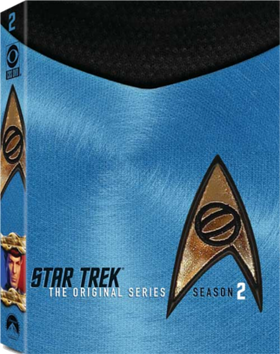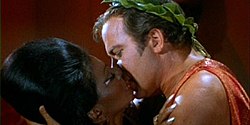Star Trek is an American science fiction television series created by Gene Roddenberry that follows the adventures of the starship USS Enterprise (NCC-1701) and its crew. It acquired the retronym of Star Trek: The Original Series to distinguish the show within the media franchise that it began.

Spock is a fictional character in the Star Trek media franchise. He first appeared in the original Star Trek series serving aboard the starship USS Enterprise as science officer and first officer and later as commanding officer of the vessel. Spock's mixed human–Vulcan heritage serves as an important plot element in many of the character's appearances. Along with Captain James T. Kirk and Dr. Leonard "Bones" McCoy, he is one of the three central characters in the original Star Trek series and its films. After retiring from active duty in Starfleet, Spock served as a Federation ambassador, and later became involved in the ill-fated attempt to save Romulus from a supernova, leading him to live out the rest of his life in a parallel universe.

Nyota Uhura, or simply Uhura, is a fictional character in the Star Trek franchise. In the original television series, the character was portrayed by Nichelle Nichols, who reprised the role for the first six Star Trek feature films. A younger Uhura is portrayed by Celia Rose Gooding in the 2022 prequel series Star Trek: Strange New Worlds, while an alternate timeline version of Uhura has been portrayed by actress Zoe Saldaña in the feature films Star Trek (2009), Star Trek Into Darkness (2013), and Star Trek Beyond (2016).

Nichelle Nichols was an American actress, singer and dancer whose portrayal of Uhura in Star Trek and its film sequels was groundbreaking for African American actresses on American television. From 1977 to 2015, she volunteered her time to promote NASA's programs and recruit diverse astronauts, including some of the first female and ethnic minority astronauts.

Christine Chapel is a fictional character who appears in all three seasons of the American science fiction television series Star Trek: The Original Series, as well as Star Trek: The Animated Series and the films Star Trek: The Motion Picture and Star Trek IV: The Voyage Home. Portrayed by Majel Barrett, she was the ship's nurse on board the Starfleet starship USS Enterprise. A younger version of Chapel appears in the 2022 series Star Trek: Strange New Worlds, portrayed by Jess Bush.
"The Lorelei Signal" is the fourth episode of the first season of the animated American science fiction television series Star Trek. It first aired in the NBC Saturday morning lineup on September 29, 1973, and was written by Margaret Armen, author of three Original Series episodes.
"Plato's Stepchildren" is the tenth episode of the third season of the American science fiction television series Star Trek. Written by Meyer Dolinsky and directed by David Alexander, it was first broadcast on November 22, 1968.
Sexuality has been a significant theme in the various Star Trek television and motion-picture series. Sexual relationships in Star Trek have mostly been depicted as heteronormative in nature. There have been depictions of bisexual relationships, but always with a twist. In Star Trek Discovery, there are two same-sex marriages, while in Star Trek Enterprise a polyamorous character, Phlox, has three wives, who have three husbands each, the marriages being depicted as open to romantic and sexual relationships with others.

Fred Freiberger was an American film and television writer and television producer, whose career spanned four decades and work on films such as The Beast from 20,000 Fathoms (1953) and TV series including Ben Casey (1963–64), The Wild Wild West (1965), Star Trek (1968–69) and Space: 1999 (1976–77).
"The Jihad" is the sixteenth and final episode of the first season of the American animated science fiction television series Star Trek. It first aired in the NBC Saturday morning lineup on January 12, 1974, and was written by Stephen Kandel who also wrote the earlier story "Mudd's Passion" and worked on the two Original Series "Mudd" episodes.
"Once Upon a Planet" is the ninth episode of the first season of the American animated science fiction television series Star Trek. It first aired in the NBC Saturday morning lineup on November 3, 1973, and was written by American television writers Chuck Menville and Len Janson.
The "Theme from Star Trek" is an instrumental musical piece composed by Alexander Courage for Star Trek, the science fiction television series created by Gene Roddenberry that originally aired between September 8, 1966, and June 3, 1969.

The science fiction multimedia franchise of Star Trek since its original debut in 1966 has been one of the most successful television series in science fiction television history and has had a large influence in popular culture as a result.

"The Last Voyage of the Starship Enterprise" is a comedy sketch that first aired on May 29, 1976, during episode 22 of the first season of the NBC variety show, Saturday Night Live. The twelve-minute sketch was written by Michael O'Donoghue during a month-long process consulting with actor John Belushi. The sketch is a satire of the 1969 cancellation of Star Trek. The set design featured an effective replica of the bridge of the USS Enterprise. Dress rehearsal was difficult, with the writer doubting whether Belushi was able to pull off an effective parody of William Shatner's performance as Captain James Kirk. However, the result was a success, and O'Donoghue immediately congratulated Belushi after his performance and reflected that he had perfectly parodied Shatner as Kirk.

The second season of the American science fiction television series Star Trek, premiered on NBC on September 15, 1967 and concluded on March 29, 1968. It consisted of twenty-six episodes. It features William Shatner as Captain James T. Kirk, Leonard Nimoy as Spock and DeForest Kelley as Leonard McCoy.

The third and final season of the American science fiction television series Star Trek, premiered on NBC on Friday, September 20, 1968 and concluded on Tuesday, June 3, 1969. It consisted of twenty-four episodes. Star Trek: The Original Series is an American science fiction television series produced by Fred Freiberger, and created by Gene Roddenberry, and the original series of the Star Trek franchise. It features William Shatner as Captain James T. Kirk, Leonard Nimoy as Spock and DeForest Kelley as Leonard McCoy.
The date and program of the first interracial kiss on television is a much debated topic. In many parts of the world social stigma and legislation have hindered relations between people from different groups (races). The first kiss on television has been discussed in the context of this social stigma. As there is no agreement on what constitutes a race there is also no general agreement on when the first interracial kiss occurred and a number of claims exist.

The development of Spock, a fictional character first introduced in the American science fiction television series Star Trek, began prior to the start of the series. The first known mention of Spock was in a discussion between Gene Roddenberry and Gary Lockwood, where the latter suggested Leonard Nimoy for the role. Roddenberry agreed with the suggestion, and Nimoy became the first choice actor for the part. However, Roddenberry was required to audition other actors for the role. It was offered to both DeForest Kelley and Martin Landau before Nimoy. Nimoy disliked the prosthetic ears he was required to wear, and there were concerns from the studio that they made him appear satanic. Roddenberry fought to keep the character in the second pilot, "Where No Man Has Gone Before" after the rest of the main cast was dropped from the initial pilot, "The Cage".











